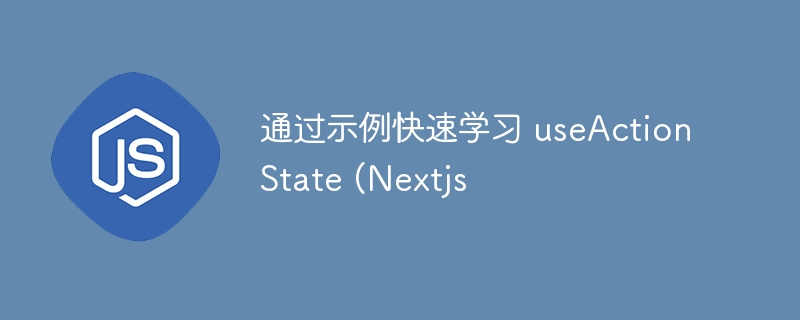通过示例快速学习 useActionState (Nextjs

使用表单时,useactionstate 挂钩简化了捕获表单值并将其作为 formdata 传递到服务器操作的过程。
useactionstate 还通过使用服务器操作返回的值自动更新状态变量来管理状态。这对于渲染输入字段验证错误特别有帮助,如下面使用 zod 的示例所示。
form.tsx:
"use client";
import { useactionstate } from "react";
import { signup } from "../actions";
export default function signup() {
const [state, action] = useactionstate(signup, {});
return (
<form action={action}>
<div>
<label htmlfor="username">username:</label>
<input
type="text"
id="username"
name="username"
defaultvalue={state.username}
required
/>
{state.errors?.username && (
<p classname="text-sm text-red-500">{state.errors.username}</p>
)}
</div>
<div>
<label htmlfor="password">password:</label>
<input
type="password"
id="password"
name="password"
defaultvalue={state.password}
/>
{state.errors?.password && (
<p classname="text-sm text-red-500">{state.errors.password}</p>
)}
</div>
<input type="submit" value="sign up" />
</form>
);
}
actions.ts:
"use server";
import { z } from "zod";
const SignUpSchema = z.object({
username: z.string(),
password: z
.string()
.min(8, { message: "Be at least 8 characters long" })
.regex(/[a-zA-Z]/, { message: "Contain at least one letter." })
.regex(/[0-9]/, { message: "Contain at least one number." })
.regex(/[^a-zA-Z0-9]/, {
message: "Contain at least one special character.",
})
.trim(),
});
export type SignUpActionState = {
username?: string;
password?: string;
errors?: {
username?: string[];
password?: string[];
};
};
export async function signUp(
_prevState: SignUpActionState,
form: FormData
): Promise<SignUpActionState> {
const username = form.get("username") as string;
const password = form.get("password") as string;
const validatedFields = SignUpSchema.safeParse({
username,
password,
});
if (!validatedFields.success) {
return {
username,
password,
errors: validatedFields.error.flatten().fieldErrors,
};
}
// process validated form inputs here
return { username, password };
}
useactionstate 还返回一个 ispending 属性(示例),指示服务器操作的 promise 是否仍在解析。
参考 ispending 暂时禁用表单元素,例如提交按钮,以防止用户在正在进行的操作完成之前快速连续多次单击它。
useactionstate 与 useformaction 和 useformstatus
如果您熟悉 useformaction 和 useformstatus,您会发现 useactionstate 非常相似。
本质上,它结合了两个钩子的功能,并被重命名以反映服务器操作不仅仅适用于表单(您还可以将 useactionstate 与按钮和其他元素一起使用。)
请记住,useformstatus 从 next.js 15 开始已被弃用,因此您应该继续导入 useactionstate。
以上就是通过示例快速学习 useActionState (Nextjs的详细内容,更多请关注硕下网其它相关文章!
